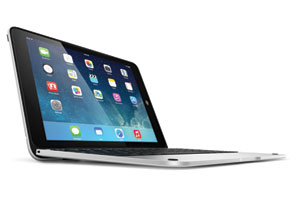How the Generational Security Gap Affects Security
Despite concerns about technology, clearly Americans still have a hard time unplugging.

|
|
Tablet computers are now assuming an important role with tech savvy users, including security staff members who use them to view security video and alarm info. Photo courtesy of PRNewsFoto/ClamCase |
I used to write stories like this on a typewriter back in the day. My articles turned out to be a mass of White-Outs to counter typing mistakes. It all made me dizzy.
Today’s computer technology even auto-corrects my words, which sometimes is not a good thing. The philosopher Plato kind of agrees. He famously objected to the very notion of written words, for fear that committing thoughts and events to paper would erode people’s ability to retain such things through memory alone.
There is no doubt that technological advances have touched all of us, including fast-moving developments within security and life safety. Many of them have come from military and computer applications.
But, has that been a good touch? Does everyone share in the tech delights? And do the disadvantages seem to outpace the advantages?
A recent study by Harris Interactive tries to find out. And the bottom line: Americans are divided on how technology impacts the way we live our lives. On the one hand, strong majorities believe that technology has improved the overall quality of their lives (71 percent) and encourages people to be more creative (65 percent). But, at the same time, strong majorities also believe technology is creating a lazy society (76 percent), has become too distracting and intrusive (69 percent) and is corrupting interpersonal communications (68 percent).
Cannot Unplug
Despite concerns about technology, clearly Americans still have a hard time unplugging. That’s also the case for enterprise security leaders, who see increased value in getting alarms and security video anywhere on a laptop, smartphone or tablet. It’s become a way of life for most everyone.
These divergent perspectives on technology are not limited to U.S. adults at large; a comparison of Americans by generation reveals an equally complex picture. The Harris poll confirmed what we likely all know – that younger generations are more likely to own such high tech goodies. However, this should not be taken to mean that these younger Americans are more affectionate towards technology. In fact, Echo Boomers are consistently more likely than their older counterparts to indicate that technology has a negative impact.
No doubt, younger folks, growing up with the new-age devices, are at times more comfortable with technology including card and smartphone access control, biometrics and security video. At the same time, they are more sensitive of the potential dark side.
Shine Off the Tech Apple
There appears to be year-over-year erosion in how Americans feel technology is affecting several aspects of their lives. Though Americans are consistently more likely to report a positive impact than a negative one for all aspects tested, many of these perceived positive effects have declined in comparison to 2012, according to Harris Interactive.
- My work productivity (down from 42 percent in 2012 to 34 percent in 2013).
- My work life (41 percent-34 percent).
- My safety and security (42 percent-36 percent).
- My productivity at home (39 percent-34 percent).
- Relationships with my family (43 percent-39 percent).
Even with a higher likelihood to see negative effects of technology on their lives, younger Americans nonetheless prove to be less willing to part with their goodies, with Echo Boomers and Gen Xers (33 percent and 30 percent, respectively) more likely than Baby Boomers (22 percent) or Matures (16 percent) to indicate that they could not live without a mobile phone.
- My productivity at home (33 percent Echo Boomers, 21 percent Gen Xers, 18 percent Baby Boomers, 13 percent Matures).
- My safety and security (25 percent, 19 percent, 17 percent and 14 percent, respectively).
- Relationships with my family (18 percent, 10 percent, 7 percent and 5 percent, respectively).
- My work productivity (17 percent, 9 percent, 3 percent and 4 percent, respectively).
- My happiness (15 percent, 6 percent, 5 percent and 4 percent, respectively).
Looking for a reprint of this article?
From high-res PDFs to custom plaques, order your copy today!








